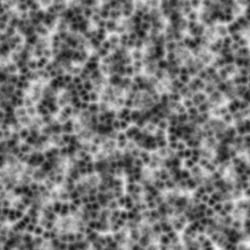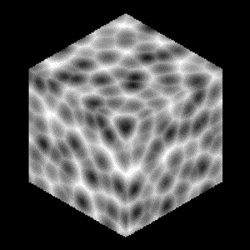6 releases (stable)
Uses new Rust 2024
| 1.2.0 | Apr 29, 2025 |
|---|---|
| 1.1.2 | Feb 28, 2024 |
| 1.1.1 | Jan 12, 2024 |
| 1.0.0 | Nov 11, 2023 |
| 0.1.0 | Aug 9, 2023 |
#191 in Math
427 downloads per month
Used in noiz
5.5MB
3K
SLoC
libnoise
A simple, performant, and customizable procedural noise generation library inspired by libnoise for C++ featuring:
- Easy coherent noise generation through sources provided via
Source - Modular generator creation by chaining adapters to modify and combine
generator inputs and outputs, and the ability to flexibly create
custom generators and adapters, all through the
Generatortrait - Efficient and cache friendly sampling of generators through
NoiseBufferand much of the generator complexity resolving at compile time - Easy visualization of generator outputs for debugging through
Visualizer
Libnoise provides utilities to generate coherent noise and customize them by applying a variety of operations which modify and combine generators. With a focus on customizability, the library allows users to create custom generators and modifiers.
Most immediately relevant documentation can be found in
Source and
Generator docs.
Usage
First, add the dependency to your project by editing your Cargo.toml:
[dependencies]
libnoise = "1.2"
To get started easily, create a source generator using one of the many
sources found in Source,
and apply adapters documented in Generator.
For a more detailed introduction, see the quickstart guide.
use libnoise::prelude::*;
// build a simplex noise generator seeded with 42
let generator = Source::simplex(42);
// sample the generator for input point [0.2, 0.5]
let value = generator.sample([0.2, 0.5]);
Note how the dimensionality, which is internally represented as a constant generic argument, is automatically inferred by sampling the generator with a 2-dimensional input point.
Naturally, we can create more interesting complex generators:
use libnoise::prelude::*;
// build a generator
let generator = Source::simplex(42) // start with simplex noise
.fbm(5, 0.013, 2.0, 0.5) // apply fractal brownian motion
.blend( // apply blending...
Source::worley(43).scale([0.05, 0.05]), // ...with scaled worley noise
Source::worley(44).scale([0.02, 0.02])) // ...controlled by other worley noise
.lambda(|f| (f * 2.0).sin() * 0.3 + f * 0.7); // apply a closure to the noise
// sample the generator for input point [0.2, 0.5]
let value = generator.sample([0.2, 0.5]);
We can also use NoiseBuffer for efficiently filling n-dimensional arrays
with noise, and Visualizer to get a visual representation of a given
generator. The above generator produces the following image, when sampled for
every pixel position:

It is common to interpret the 3rd or 4th dimension as time, allowing us to produce space-time noise such as:

Contributing
Contributors and feature suggestions are welcome!
Should you want to contact me directly, it is best via discord (username: oogie).
License
Libnoise is distributed under the terms of the MIT license.
See LICENSE-MIT for details.
Dependencies
~2–12MB
~125K SLoC